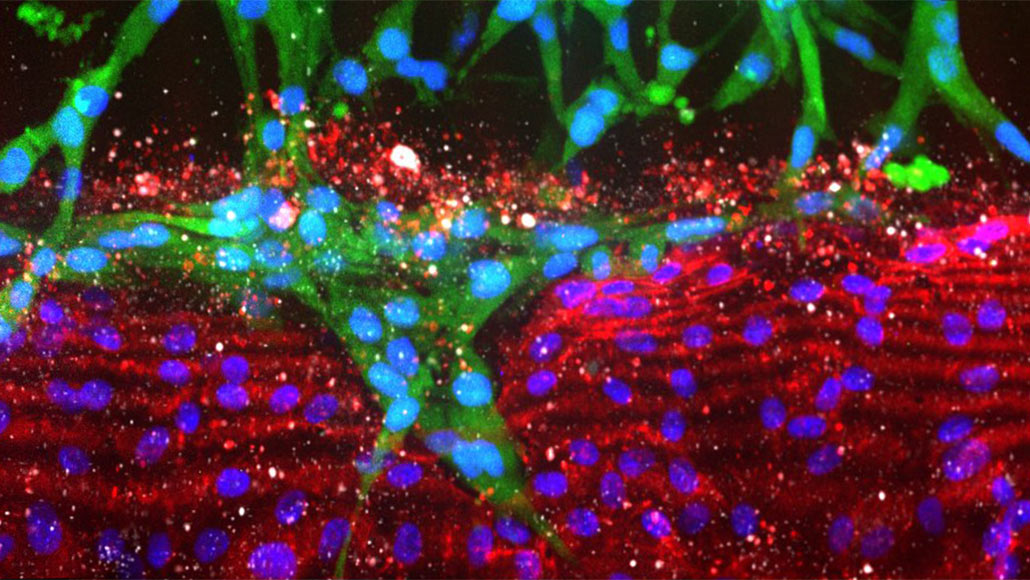Pancreatic cancer tumors attack the blood vessels that deliver chemo drugs
New insights into how pancreatic cancer spreads could lead to more effective treatments

New research finds that pancreatic cancer cells (green) invade and kill surrounding blood vessels (red). This could explain why this deadly cancer is so hard to treat: most chemotherapy drugs use the tumor's blood supply as a delivery mechanism.
Duc-Huy Nguyen and Esak Lee
Pancreatic cancer is nearly impossible to treat. New research now shows this may be because its tumors destroy the surrounding blood vessels that doctors typically rely on to deliver anti-cancer drugs.
Armed with this new knowledge, researchers have zeroed in on how the tumors kill neighboring blood vessel cells. When the team knocked out part of a molecular messaging system underlying the tumor’s deadly progression, its growth slowed, and the density of surrounding blood vessels increased both in mice and in human cells in a dish, the team reports August 28 in Science Advances.
A drug that does the same thing in humans “could rescue the blood vessels around the tumor and allow us to deliver drugs to the patient that would shrink the tumor mass, which is currently impossible to do,” says Duc-Huy Nguyen, a molecular biologist at Weill Cornell Medicine in New York City, who did the research while at the University of Pennsylvania.
Pancreatic cancer is among the deadliest cancers: More than 90 percent of the estimated 56,770 Americans who will be diagnosed with the disease in 2019 are predicted to die within five years. Cancer of this sweet potato–sized organ has long puzzled researchers. The tumors appear to spread via the bloodstream, yet the tumors themselves have little to no blood supply.
Understanding how pancreatic cancer grows and spreads throughout the body has proven difficult because the pancreas is nestled deep in the belly, just behind the stomach. Monitoring a tumor or removing sections of it for study requires cutting the patient open and weaving through other vital organs, increasing the risk of infection or other complications.
So to get a closer look, Nguyen and colleagues embedded live human pancreatic cancer cells and human endothelial cells, a type of cell lining blood vessels, in transparent plastic chips about the size of an adult’s thumb. This so-called “organ on a chip” had two channels running through a gel made of the protein collagen. The researchers seeded one channel with pancreatic cancer cells to mimic a tumor and the other with the endothelial cells to mimic a blood vessel.
After four days, the pancreatic cancer cells sent tendrils out into the gap between the channels that ensnared the “blood vessel.” Eight hours after the start of the invasion, endothelial cells started dying. Within seven days, the cancer cells had killed 20 percent of endothelial cells, taking their place, and the takeover showed no signs of slowing. The researchers went on to observe the same brutal sequence of events in live mice.
“Explaining why drugs weren’t able to reach pancreatic cancer cells is … quite a coup,” says Charles Saxe, a cancer cell biologist with the American Cancer Society based in Atlanta who was not involved in the study. “With more observation, this could also tell us how the tumors spread so quickly.”
The researchers then hunted for the mechanism by which the tumors kill endothelial cells. A prime suspect was a group of proteins called transforming growth factor beta, or TGF-beta, which have been implicated in stimulating tumor growth in other cancers. In experiments, the team went through a list of other proteins known to interact with TGF-beta and ultimately found the culprit: the ALK7 receptor protein. Getting rid of the ALK7 receptor prevented the cancer cells from killing endothelial cells, and slowed the tumor’s growth in the organ on a chip and in mice. Additional studies will be needed to find out whether these results can be replicated with pancreatic cancer in humans.
Identifying how the tumors kill the endothelial cells provides a new target for drugs in a disease where there is a desperate need for new treatments.
“One of the really exciting parts about this is that they’ve found a molecular explanation that we already have some hope of inhibiting,” Saxe says. Drugs inhibiting ALK7’s activity are already in clinical trials. So when it comes to pancreatic cancer, the new findings “could have a clinical impact as soon as two years from now,” he says.
The team is now looking at adding immune cells and perivascular cells, which surround and support blood vessels, to its organ on a chip models. Adding the complexity of other cell types to lab simulations will better re-create the chaotic environment inside the human body, and potentially eliminate missteps that would cost time and money in human-based clinical trials.







